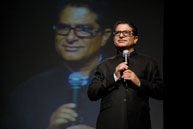Deep thoughts
Deepak Chopra delivers provocative Beatty Lecture
On September 14, Deepak Chopra opened his Beatty Memorial Lecture on "Religion and Spirituality" by telling audience members, "I'd like to share some thoughts with you."

In his lecture, Deepak Chopra said that faith is based on experience and knowledge, and requires a willingness to step into the unknown, shed all prejudice and look at the world as if for the first time.
Claudio Calligaris
In terms of understatement, it's on a par with Albert Einstein saying he'd like to take a stab at Sodoku puzzles. Chopra doesn't share ideas, he expounds upon, challenges and ultimately turns on their head some of our most cherished beliefs.
The former chief of staff at Boston Regional Medical Center, Chopra chafes at the very concept of belief.
"Belief is a cover-up for insecurity," he told the crowd gathered in one of the main halls of the Palais de Congrès. "We only believe in things we're not sure of. You don't have to ask me to believe in the laws of gravity or electricity, so why should I have to believe in God if God is real?"
"If we have faith in the religious experiences of the great founders of the world's religions, like Christ or Buddha or the many other luminaries, then we must ask ourselves, 'Can I have the experience on which this faith is founded?'"
A man of science, Chopra began his own religious journey after witnessing the unexplainable recovery of gravely ill patients. "They had a shift in consciousness that allowed them to experience an identity that was beyond their skin-encapsulated persona and marked the return of the memory of wholeness," he said. "And while they were in this domain of universal awareness, there were remarkable shifts in their biology."
The world and our perception of it, says Chopra, is very much like a movie. What looks like one continuous experience is actually a series of still frames separated by gaps that are imperceptible when run at the proper speed. For example, speech requires the vibration of vocal chords that cause ripples in the atmosphere that our brain somehow translates into fluid sound.
On a more profound level, because we are made up of subatomic particles, which themselves are nothing more than fluctuations of energy in a void, our bodies, if seen as they really are, would be nothing more than a huge emptiness with a few scattered dots and some random electrical discharges. "The universe is going on and off at the speed of light. At the most fundamental level, you and I and everything else in creation are in genesis and reconstruction right at this moment," said Chopra. "The big question in science right now is not 'What is in the On of the universe?' because we know it is information and energy that creates time and matter. The fundamental question is what's in the Off?"
This is where it gets tricky. When the universe hits Off, says Chopra, everything is instantly connected to and synchronized with everything else. There is no energy, no information and no objects, "Only waves of infinite possibilities," said Chopra.
The Off phase is also marked by quantum leaps of creativity in which one pattern of behaviour is followed by another without any apparent transitional phase. "If we truly understood the phenomenon of evolution, with the huge gaps in fossil records and leaps of creativity, then the true meaning of creative design would become obvious," said Chopra.
"We know our physical universe through our five senses," continued Chopra. "The law of thermodynamics allows us to understand decay. We understand cause and effect and that organisms are born and die. This is our obvious universe." Then there is the quantum domain in which everything is oscillating at wavelength frequency, added Chopra, and only probabilities can be measured. All our technologies, including cell phones and the Internet, are based on this domain, he said. This world we know. But, as Chopra pointed out, there is more, a level of perception that, as challenging as it is to follow during a lecture, offers the promise of something we all yearn for: wholeness.

